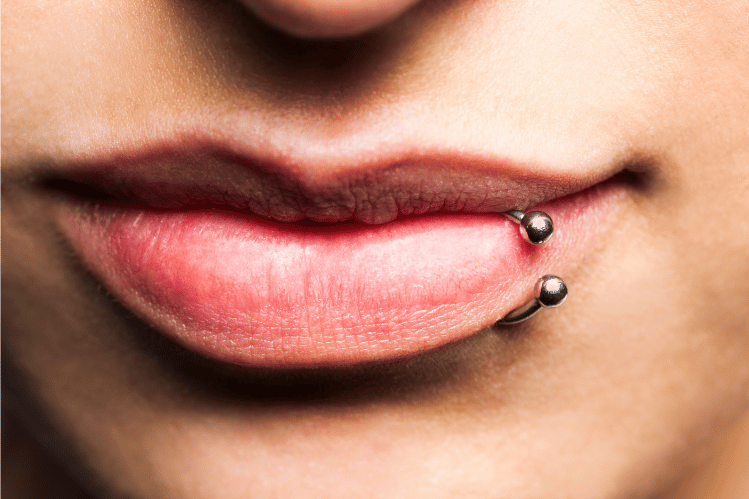
Introduction
Oral piercings can be a popular form of self-expression, but they are not without risk. Both tongue and lip piercings can have a significant impact on dental health, and understanding these risks is vital for anyone considering such an adornment.
This blog post will explore the risks associated with oral piercings and provide guidance on aftercare to minimize potential problems.
Risks of Oral Piercings
- Infection: The mouth is teeming with bacteria, and an oral piercing can create an entryway for these bacteria to penetrate the deeper tissues. This can lead to infections around the piercing site that, if not treated promptly, can spread to other areas of the body. A severe infection may even require hospitalization. Careful hygiene, following the aftercare instructions of a professional piercer, and avoiding unsterilized tools and jewelry can mitigate this risk.
- Damage to Teeth: Oral piercings, particularly tongue piercings, may cause cracked or chipped teeth. The constant clicking or biting of the jewelry against teeth can cause fractures over time, necessitating expensive dental work. Even small chips can cause issues such as sensitivity and cavities. Choosing the correct type and size of jewelry, and being mindful not to play with the piercing, can reduce this risk.
- Gum Disease: The rubbing of piercings against gum tissue may lead to receding gums. This can expose the roots of teeth, leading to increased sensitivity and vulnerability to decay. Over time, this may even lead to tooth loss. Regular dental check-ups, combined with careful oral hygiene, can help in early detection and treatment of any gum issues related to the piercing.
- Nerve Damage: An improperly done piercing can cause nerve damage, leading to temporary or even permanent numbness. In some cases, it may affect taste or the movement of the mouth. Always seek a professional and experienced piercer who knows the correct placement to avoid major nerve bundles, and consult with them on any concerns you may have.
- Oral Functioning Problems: Oral piercings might cause difficulties in speaking, chewing, or swallowing, particularly in the first few weeks after the piercing. This may lead to malnutrition or speech difficulties. Being aware of these potential issues and following proper aftercare can alleviate these problems as the piercing heals.
- Allergic Reactions: Metals used in jewelry may cause allergic reactions, leading to discomfort and potential complications. It can be a localized reaction around the piercing site or, in rare cases, a systemic allergic reaction. Opting for jewelry made of hypoallergenic materials like surgical- grade stainless steel, titanium, or niobium can prevent such reactions.
- Hindrance to Dental Care Oral piercings can obstruct X-rays and regular dental cleaning, leading to undiagnosed issues or difficulties in maintaining oral health. The jewelry may hide cavities or other dental problems, or interfere with professional dental cleaning. Informing your dental care provider about your piercing and cooperating with their instructions can mitigate this risk.
Aftercare Tips

Oral piercings require diligent aftercare to minimize risks and promote healing. Here are some key tips:
- Clean Regularly:Proper cleaning is vital to prevent infections and promote healing. Use a mild, alcohol-free mouthwash to rinse your mouth after meals to keep the area free from food particles. Also, gently clean the jewelry and surrounding area with appropriate solutions, as recommended by your piercer. Avoid over-cleaning as it might irritate the area and slow down the healing process. If you're unsure of what products to use, consult with your piercing professional to get specific recommendations.
- Avoid Playing with the Jewelry: The novelty of an oral piercing may lead to a habit of playing with the jewelry using your tongue or teeth. Unfortunately, this can result in damage to teeth, gums, and the piercing itself. Constant movement may also delay the healing process and increase the risk of infection. Be mindful of these risks and consciously avoid playing with your piercing, particularly during the healing period.
- Eat Soft Foods Initially: During the first few weeks after getting an oral piercing, your mouth will be more sensitive, and you may experience swelling. Opting for soft foods that are easy to chew can alleviate discomfort and prevent accidental biting on the jewelry. Avoid spicy or acidic foods that might irritate the piercing site, and be cautious with hot beverages that may cause swelling or discomfort.
- Monitor for Signs of Infection:Early detection of an infection can prevent serious complications. Regularly inspect the piercing area for signs like redness, swelling, or unusual discharge, and pay attention to any persistent pain or discomfort. If you notice any of these signs, seek professional medical help immediately. Prompt treatment with antibiotics or other prescribed medications can usually resolve an infection before it becomes more serious.
- Regular Dental Check-upsOral piercings can have long-term effects on dental health, making regular dental check- ups more important than ever. Regular visits to the dentist will ensure that any potential issues related to the piercing are caught early and addressed appropriately. Inform your dentist about your piercing so they can take special care during cleanings and other procedures.
- Choose the Right JewelryThe type of metal used in oral piercing jewelry can have a significant impact on how your body reacts to the piercing. Opt for jewelry made of surgical-grade stainless steel, titanium, or niobium, as these materials are less likely to cause allergic reactions. The size and shape of the jewelry are also crucial; too large or heavy pieces can cause additional strain and complications. Consult with your piercer to choose the most appropriate jewelry for your specific piercing and personal style.
Conclusion
Oral piercings can be a unique way to express oneself, but it’s important to be aware of the potential risks to dental health. Careful consideration, proper aftercare, and regular dental check-ups can mitigate these risks.
Always consult with a professional piercer and your dentist to make sure an oral piercing is the right decision for you. Understanding the implications and taking the proper precautions can help you enjoy your piercing with confidence and minimal risk to your oral health.
Get a Smile That Complements Your Style!
Your oral health is vital to your overall well-being, and that includes having a smile you love. If you're looking to straighten your teeth or correct your bite, AlignerCo offers customized aligners tailored just for you.
With AlignerCo's state-of-the-art technology and personalized care, you can achieve the perfect smile without the hassle of traditional braces. Our aligners are comfortable, invisible, and designed to work with your lifestyle.
Don't let anything hold you back from expressing yourself fully - not even your smile. Click here to schedule a free consultation with AlignerCo and take the first step toward a more confident you!
FAQs
Can oral piercings cause long-term dental issues?
Yes, oral piercings can lead to long-term dental issues such as cracked or chipped teeth, receding gums, and even nerve damage if not properly cared for. Regular dental check-ups and following proper aftercare guidelines can minimize these risks.
How can I prevent an infection after getting an oral piercing?
Preventing infection requires diligent aftercare. Use an alcohol-free mouthwash, clean the jewelry with appropriate solutions, avoid playing with the jewelry, and follow the specific care instructions provided by your piercer.
What materials are best for oral piercing jewelry?
Surgical-grade stainless steel, titanium, and niobium are preferred as they minimize the risk of allergic reactions. Consulting with a professional piercer will help you choose the right material for your specific needs and preferences.
Can I eat normally after getting an oral piercing?
It's best to eat soft foods that are easy to chew during the initial healing phase. Avoid spicy, acidic, or hot foods and beverages, as they may irritate the piercing site.
How long does it take for an oral piercing to heal?
Healing times can vary based on the type of piercing and individual factors. Tongue piercings typically heal in 4-6 weeks, while lip piercings may take 2-3 months. Your piercer will provide specific guidance on the expected healing time.
Will an oral piercing affect my speech?
Some individuals experience temporary changes in speech after getting an oral piercing, especially during the initial healing process. This typically resolves as you become accustomed to the jewelry and the swelling subsides.




